Leadership Report: Michelle Rhee and the DC School System Reform
VerifiedAdded on 2020/05/11
|8
|1546
|57
Report
AI Summary
This report examines the leadership of Michelle Rhee, Chancellor of the DC School System, and its impact on the educational environment. It investigates her reform plans, focusing on the effects of her policies on teachers and students. The report analyzes how Rhee's emphasis on performance metrics, such as standardized test scores, influenced teaching methods, leading to a 'teaching to the test' approach. It also discusses the ethical implications of these practices and the responsibilities of Rhee in shaping the educational landscape. The report concludes that while Rhee's initiatives aimed to improve student scores, they inadvertently led to a narrow focus on specific subjects and potentially compromised the overall quality of education. The analysis uses relevant literature to support its claims.
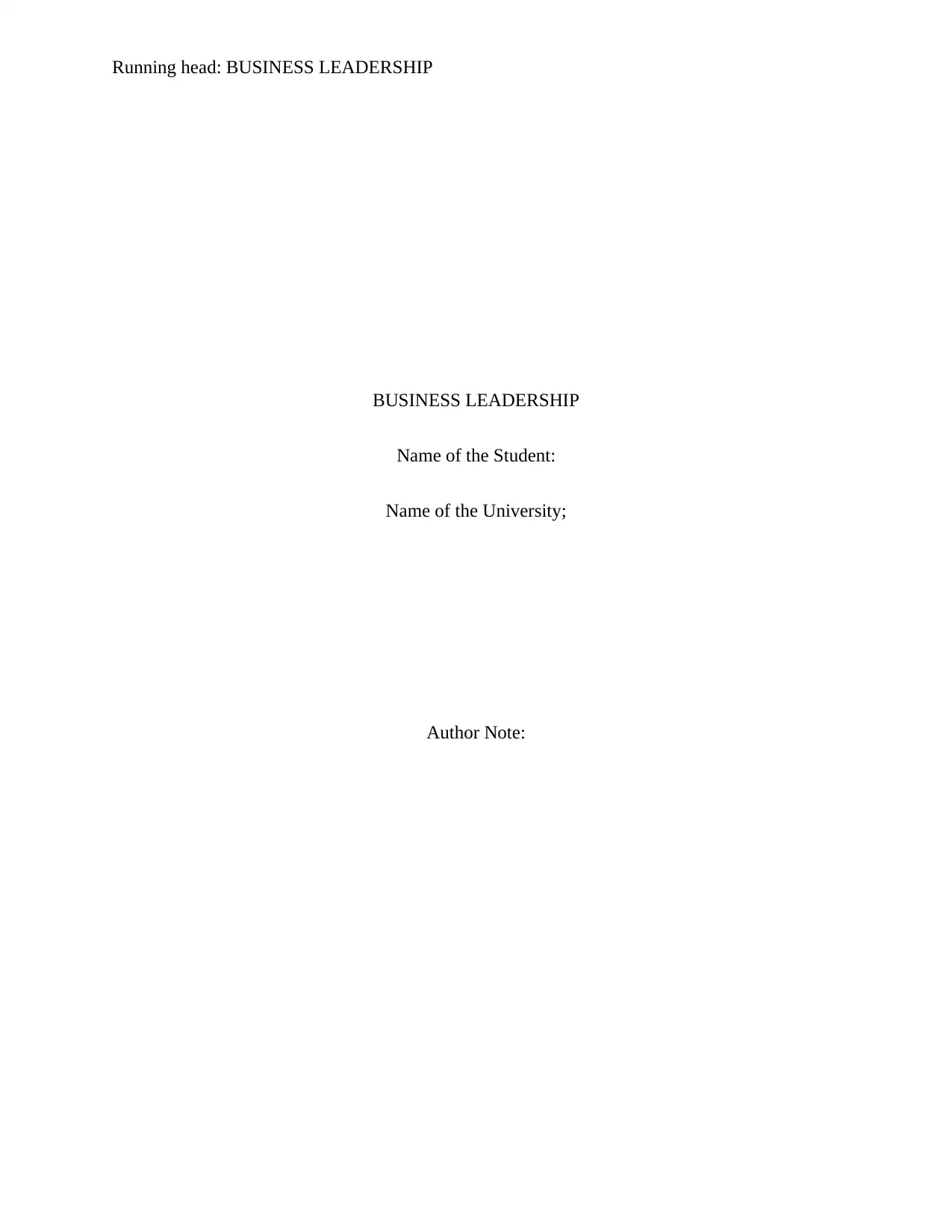
Running head: BUSINESS LEADERSHIP
BUSINESS LEADERSHIP
Name of the Student:
Name of the University;
Author Note:
BUSINESS LEADERSHIP
Name of the Student:
Name of the University;
Author Note:
Paraphrase This Document
Need a fresh take? Get an instant paraphrase of this document with our AI Paraphraser
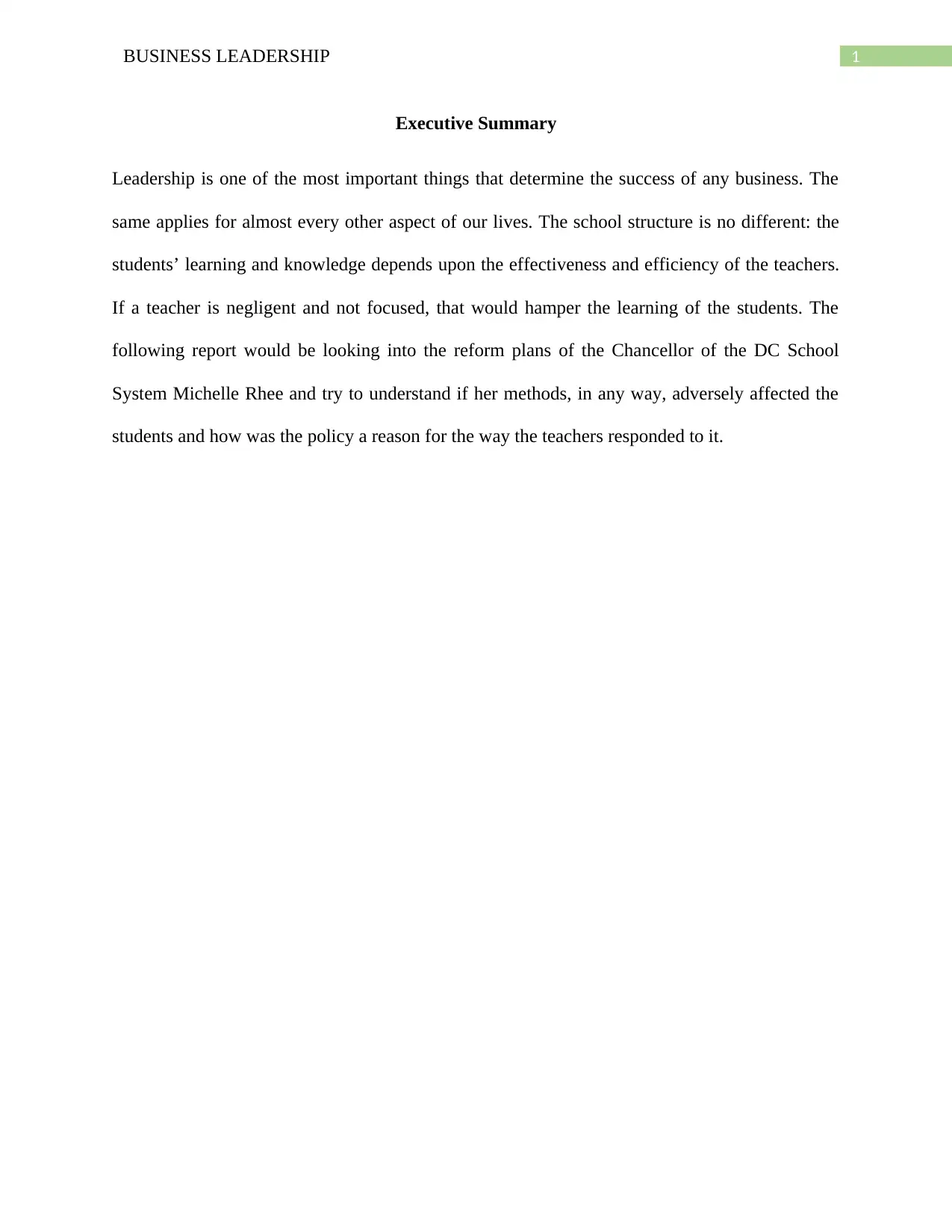
1BUSINESS LEADERSHIP
Executive Summary
Leadership is one of the most important things that determine the success of any business. The
same applies for almost every other aspect of our lives. The school structure is no different: the
students’ learning and knowledge depends upon the effectiveness and efficiency of the teachers.
If a teacher is negligent and not focused, that would hamper the learning of the students. The
following report would be looking into the reform plans of the Chancellor of the DC School
System Michelle Rhee and try to understand if her methods, in any way, adversely affected the
students and how was the policy a reason for the way the teachers responded to it.
Executive Summary
Leadership is one of the most important things that determine the success of any business. The
same applies for almost every other aspect of our lives. The school structure is no different: the
students’ learning and knowledge depends upon the effectiveness and efficiency of the teachers.
If a teacher is negligent and not focused, that would hamper the learning of the students. The
following report would be looking into the reform plans of the Chancellor of the DC School
System Michelle Rhee and try to understand if her methods, in any way, adversely affected the
students and how was the policy a reason for the way the teachers responded to it.
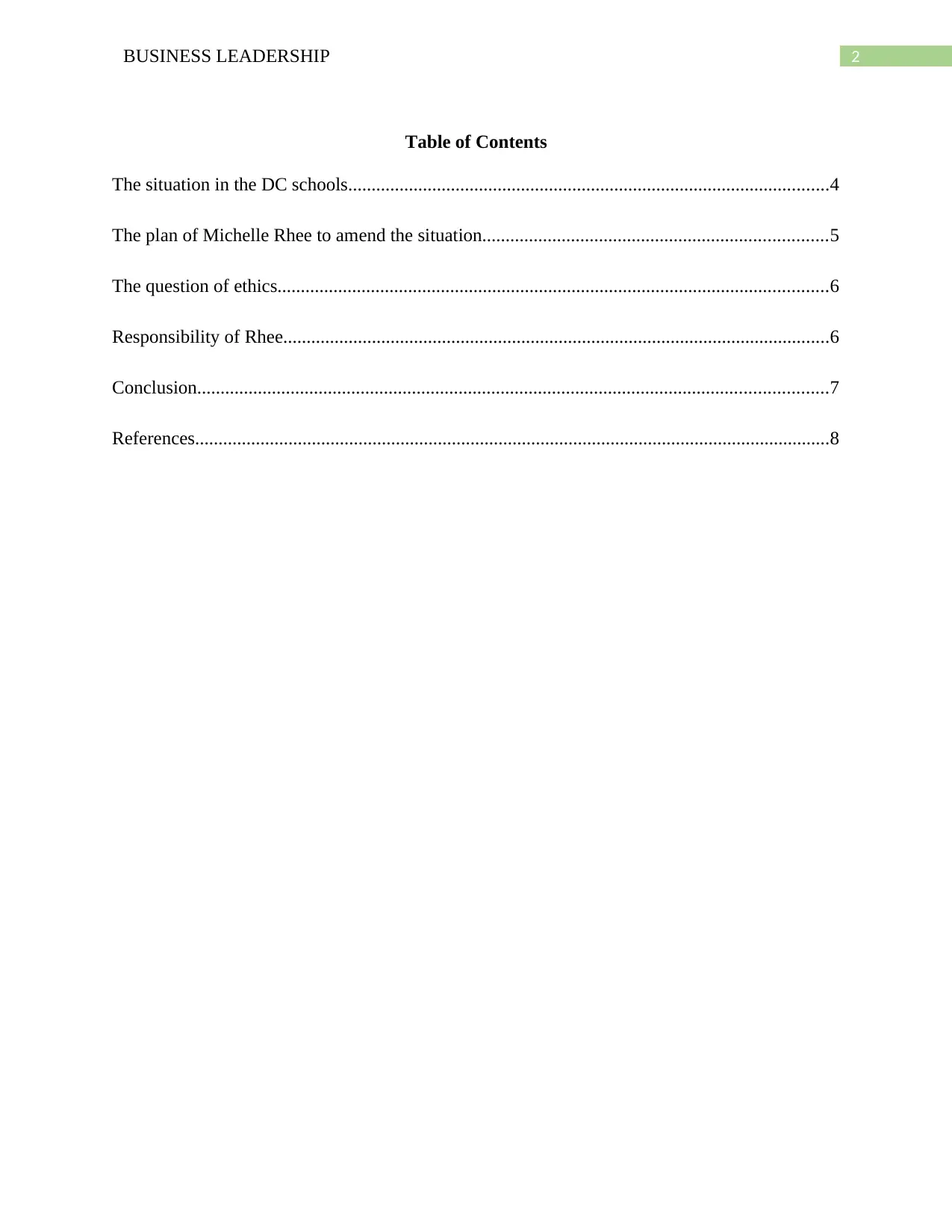
2BUSINESS LEADERSHIP
Table of Contents
The situation in the DC schools.......................................................................................................4
The plan of Michelle Rhee to amend the situation..........................................................................5
The question of ethics......................................................................................................................6
Responsibility of Rhee.....................................................................................................................6
Conclusion.......................................................................................................................................7
References........................................................................................................................................8
Table of Contents
The situation in the DC schools.......................................................................................................4
The plan of Michelle Rhee to amend the situation..........................................................................5
The question of ethics......................................................................................................................6
Responsibility of Rhee.....................................................................................................................6
Conclusion.......................................................................................................................................7
References........................................................................................................................................8
⊘ This is a preview!⊘
Do you want full access?
Subscribe today to unlock all pages.

Trusted by 1+ million students worldwide
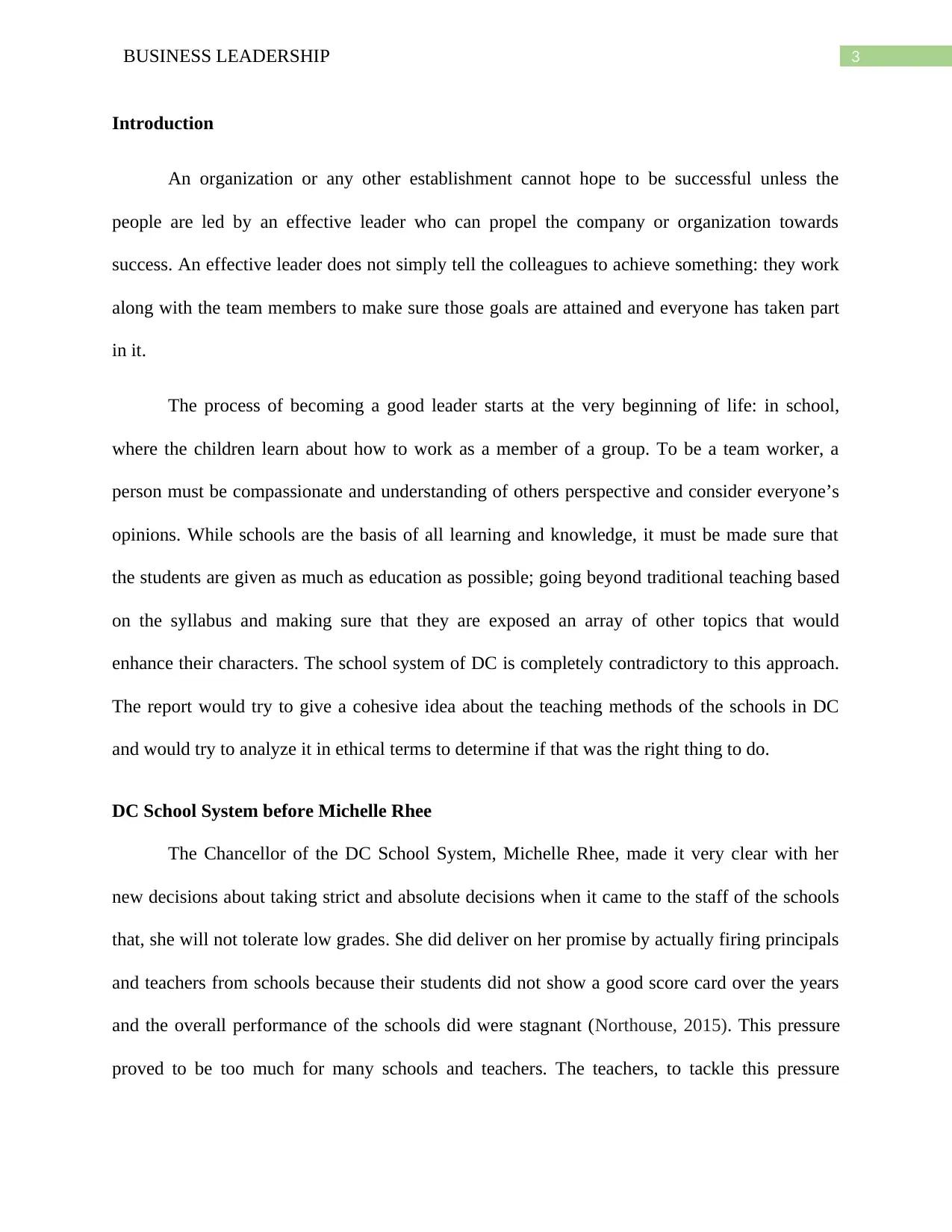
3BUSINESS LEADERSHIP
Introduction
An organization or any other establishment cannot hope to be successful unless the
people are led by an effective leader who can propel the company or organization towards
success. An effective leader does not simply tell the colleagues to achieve something: they work
along with the team members to make sure those goals are attained and everyone has taken part
in it.
The process of becoming a good leader starts at the very beginning of life: in school,
where the children learn about how to work as a member of a group. To be a team worker, a
person must be compassionate and understanding of others perspective and consider everyone’s
opinions. While schools are the basis of all learning and knowledge, it must be made sure that
the students are given as much as education as possible; going beyond traditional teaching based
on the syllabus and making sure that they are exposed an array of other topics that would
enhance their characters. The school system of DC is completely contradictory to this approach.
The report would try to give a cohesive idea about the teaching methods of the schools in DC
and would try to analyze it in ethical terms to determine if that was the right thing to do.
DC School System before Michelle Rhee
The Chancellor of the DC School System, Michelle Rhee, made it very clear with her
new decisions about taking strict and absolute decisions when it came to the staff of the schools
that, she will not tolerate low grades. She did deliver on her promise by actually firing principals
and teachers from schools because their students did not show a good score card over the years
and the overall performance of the schools did were stagnant (Northouse, 2015). This pressure
proved to be too much for many schools and teachers. The teachers, to tackle this pressure
Introduction
An organization or any other establishment cannot hope to be successful unless the
people are led by an effective leader who can propel the company or organization towards
success. An effective leader does not simply tell the colleagues to achieve something: they work
along with the team members to make sure those goals are attained and everyone has taken part
in it.
The process of becoming a good leader starts at the very beginning of life: in school,
where the children learn about how to work as a member of a group. To be a team worker, a
person must be compassionate and understanding of others perspective and consider everyone’s
opinions. While schools are the basis of all learning and knowledge, it must be made sure that
the students are given as much as education as possible; going beyond traditional teaching based
on the syllabus and making sure that they are exposed an array of other topics that would
enhance their characters. The school system of DC is completely contradictory to this approach.
The report would try to give a cohesive idea about the teaching methods of the schools in DC
and would try to analyze it in ethical terms to determine if that was the right thing to do.
DC School System before Michelle Rhee
The Chancellor of the DC School System, Michelle Rhee, made it very clear with her
new decisions about taking strict and absolute decisions when it came to the staff of the schools
that, she will not tolerate low grades. She did deliver on her promise by actually firing principals
and teachers from schools because their students did not show a good score card over the years
and the overall performance of the schools did were stagnant (Northouse, 2015). This pressure
proved to be too much for many schools and teachers. The teachers, to tackle this pressure
Paraphrase This Document
Need a fresh take? Get an instant paraphrase of this document with our AI Paraphraser
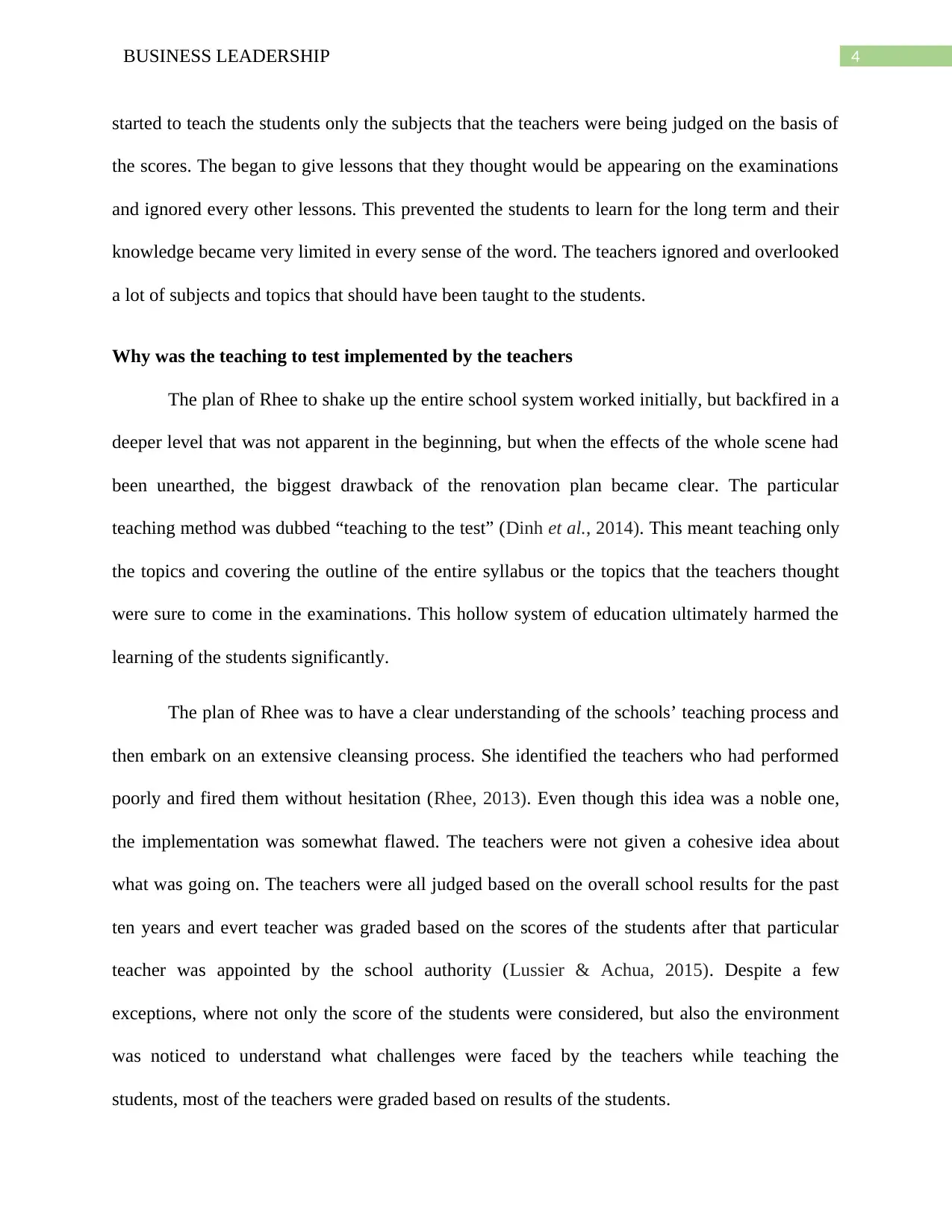
4BUSINESS LEADERSHIP
started to teach the students only the subjects that the teachers were being judged on the basis of
the scores. The began to give lessons that they thought would be appearing on the examinations
and ignored every other lessons. This prevented the students to learn for the long term and their
knowledge became very limited in every sense of the word. The teachers ignored and overlooked
a lot of subjects and topics that should have been taught to the students.
Why was the teaching to test implemented by the teachers
The plan of Rhee to shake up the entire school system worked initially, but backfired in a
deeper level that was not apparent in the beginning, but when the effects of the whole scene had
been unearthed, the biggest drawback of the renovation plan became clear. The particular
teaching method was dubbed “teaching to the test” (Dinh et al., 2014). This meant teaching only
the topics and covering the outline of the entire syllabus or the topics that the teachers thought
were sure to come in the examinations. This hollow system of education ultimately harmed the
learning of the students significantly.
The plan of Rhee was to have a clear understanding of the schools’ teaching process and
then embark on an extensive cleansing process. She identified the teachers who had performed
poorly and fired them without hesitation (Rhee, 2013). Even though this idea was a noble one,
the implementation was somewhat flawed. The teachers were not given a cohesive idea about
what was going on. The teachers were all judged based on the overall school results for the past
ten years and evert teacher was graded based on the scores of the students after that particular
teacher was appointed by the school authority (Lussier & Achua, 2015). Despite a few
exceptions, where not only the score of the students were considered, but also the environment
was noticed to understand what challenges were faced by the teachers while teaching the
students, most of the teachers were graded based on results of the students.
started to teach the students only the subjects that the teachers were being judged on the basis of
the scores. The began to give lessons that they thought would be appearing on the examinations
and ignored every other lessons. This prevented the students to learn for the long term and their
knowledge became very limited in every sense of the word. The teachers ignored and overlooked
a lot of subjects and topics that should have been taught to the students.
Why was the teaching to test implemented by the teachers
The plan of Rhee to shake up the entire school system worked initially, but backfired in a
deeper level that was not apparent in the beginning, but when the effects of the whole scene had
been unearthed, the biggest drawback of the renovation plan became clear. The particular
teaching method was dubbed “teaching to the test” (Dinh et al., 2014). This meant teaching only
the topics and covering the outline of the entire syllabus or the topics that the teachers thought
were sure to come in the examinations. This hollow system of education ultimately harmed the
learning of the students significantly.
The plan of Rhee was to have a clear understanding of the schools’ teaching process and
then embark on an extensive cleansing process. She identified the teachers who had performed
poorly and fired them without hesitation (Rhee, 2013). Even though this idea was a noble one,
the implementation was somewhat flawed. The teachers were not given a cohesive idea about
what was going on. The teachers were all judged based on the overall school results for the past
ten years and evert teacher was graded based on the scores of the students after that particular
teacher was appointed by the school authority (Lussier & Achua, 2015). Despite a few
exceptions, where not only the score of the students were considered, but also the environment
was noticed to understand what challenges were faced by the teachers while teaching the
students, most of the teachers were graded based on results of the students.
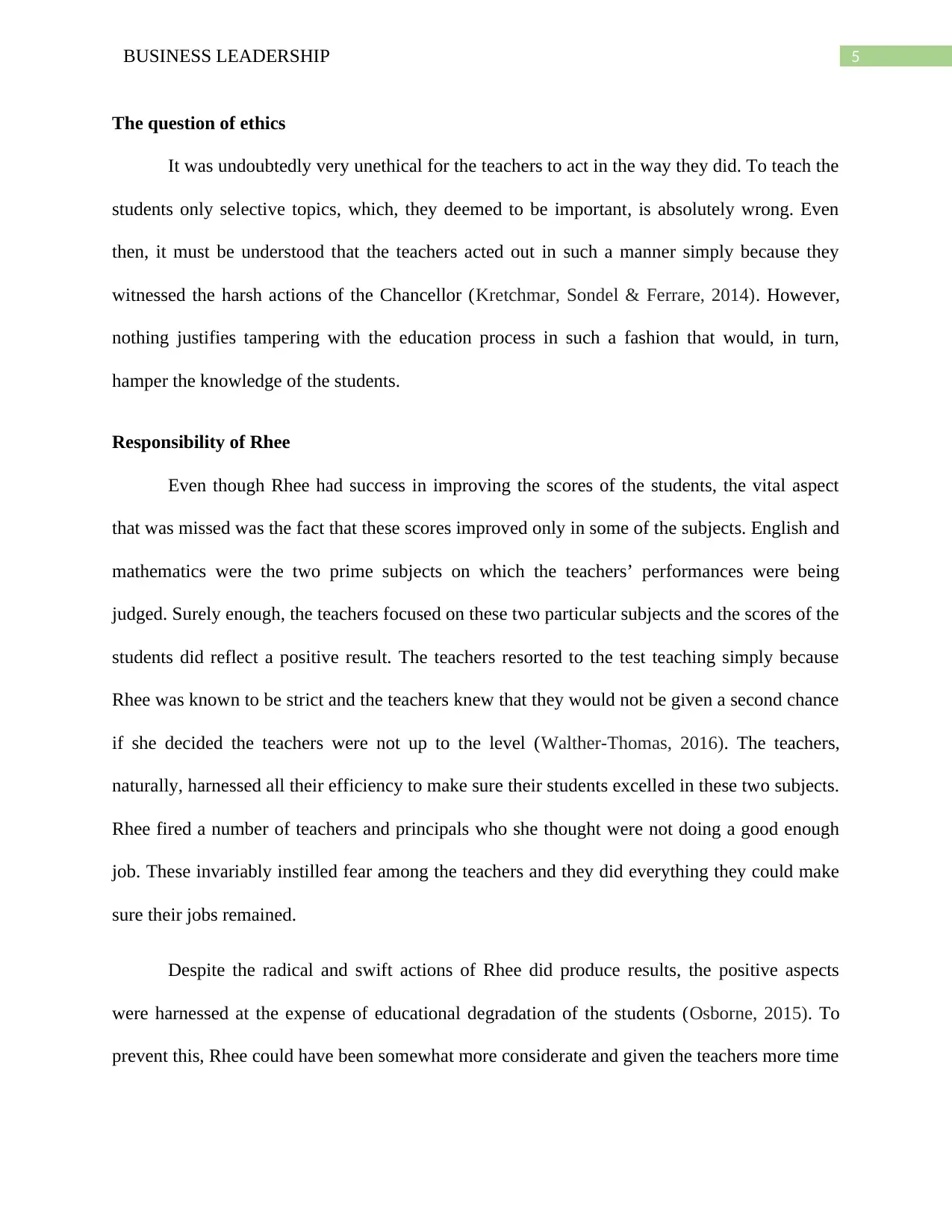
5BUSINESS LEADERSHIP
The question of ethics
It was undoubtedly very unethical for the teachers to act in the way they did. To teach the
students only selective topics, which, they deemed to be important, is absolutely wrong. Even
then, it must be understood that the teachers acted out in such a manner simply because they
witnessed the harsh actions of the Chancellor (Kretchmar, Sondel & Ferrare, 2014). However,
nothing justifies tampering with the education process in such a fashion that would, in turn,
hamper the knowledge of the students.
Responsibility of Rhee
Even though Rhee had success in improving the scores of the students, the vital aspect
that was missed was the fact that these scores improved only in some of the subjects. English and
mathematics were the two prime subjects on which the teachers’ performances were being
judged. Surely enough, the teachers focused on these two particular subjects and the scores of the
students did reflect a positive result. The teachers resorted to the test teaching simply because
Rhee was known to be strict and the teachers knew that they would not be given a second chance
if she decided the teachers were not up to the level (Walther-Thomas, 2016). The teachers,
naturally, harnessed all their efficiency to make sure their students excelled in these two subjects.
Rhee fired a number of teachers and principals who she thought were not doing a good enough
job. These invariably instilled fear among the teachers and they did everything they could make
sure their jobs remained.
Despite the radical and swift actions of Rhee did produce results, the positive aspects
were harnessed at the expense of educational degradation of the students (Osborne, 2015). To
prevent this, Rhee could have been somewhat more considerate and given the teachers more time
The question of ethics
It was undoubtedly very unethical for the teachers to act in the way they did. To teach the
students only selective topics, which, they deemed to be important, is absolutely wrong. Even
then, it must be understood that the teachers acted out in such a manner simply because they
witnessed the harsh actions of the Chancellor (Kretchmar, Sondel & Ferrare, 2014). However,
nothing justifies tampering with the education process in such a fashion that would, in turn,
hamper the knowledge of the students.
Responsibility of Rhee
Even though Rhee had success in improving the scores of the students, the vital aspect
that was missed was the fact that these scores improved only in some of the subjects. English and
mathematics were the two prime subjects on which the teachers’ performances were being
judged. Surely enough, the teachers focused on these two particular subjects and the scores of the
students did reflect a positive result. The teachers resorted to the test teaching simply because
Rhee was known to be strict and the teachers knew that they would not be given a second chance
if she decided the teachers were not up to the level (Walther-Thomas, 2016). The teachers,
naturally, harnessed all their efficiency to make sure their students excelled in these two subjects.
Rhee fired a number of teachers and principals who she thought were not doing a good enough
job. These invariably instilled fear among the teachers and they did everything they could make
sure their jobs remained.
Despite the radical and swift actions of Rhee did produce results, the positive aspects
were harnessed at the expense of educational degradation of the students (Osborne, 2015). To
prevent this, Rhee could have been somewhat more considerate and given the teachers more time
⊘ This is a preview!⊘
Do you want full access?
Subscribe today to unlock all pages.

Trusted by 1+ million students worldwide
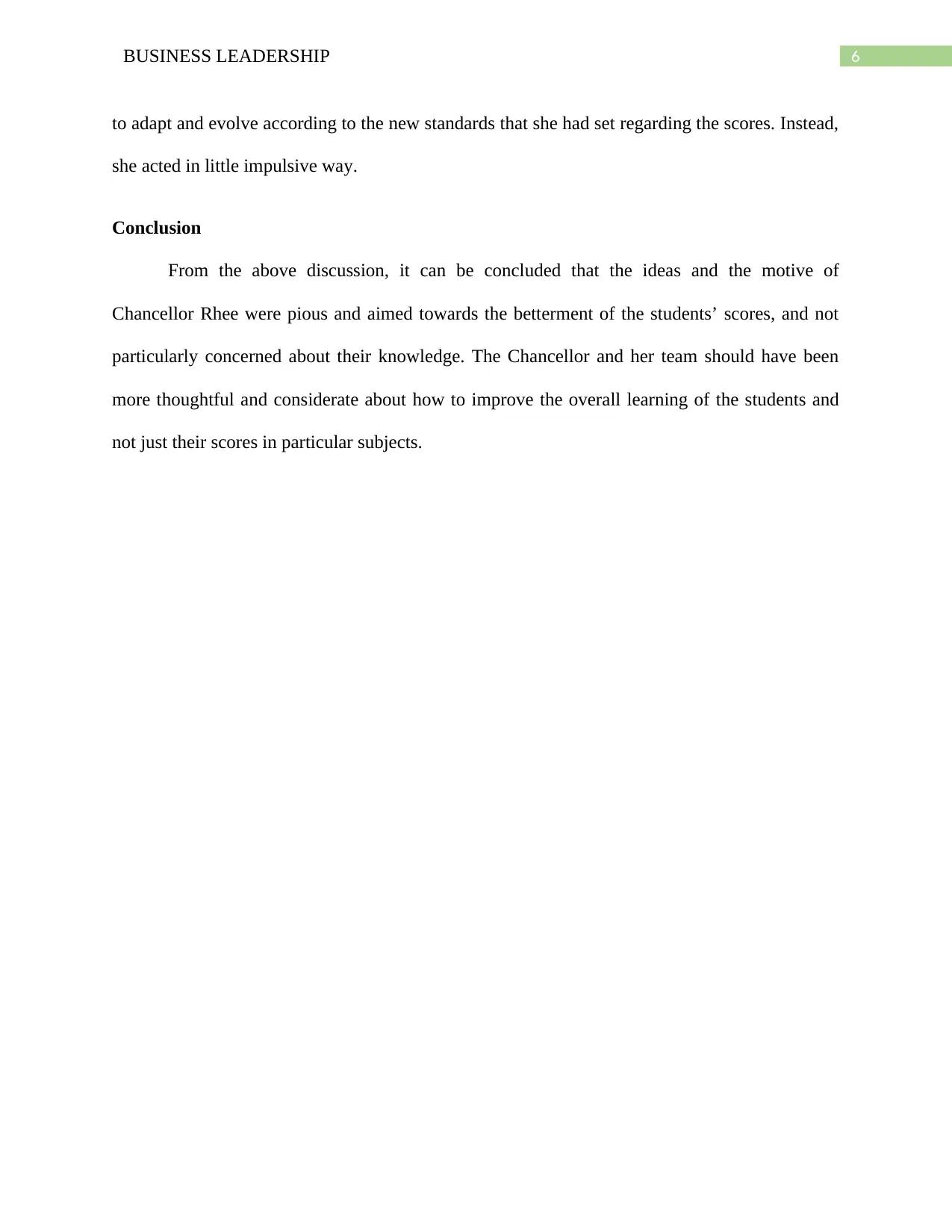
6BUSINESS LEADERSHIP
to adapt and evolve according to the new standards that she had set regarding the scores. Instead,
she acted in little impulsive way.
Conclusion
From the above discussion, it can be concluded that the ideas and the motive of
Chancellor Rhee were pious and aimed towards the betterment of the students’ scores, and not
particularly concerned about their knowledge. The Chancellor and her team should have been
more thoughtful and considerate about how to improve the overall learning of the students and
not just their scores in particular subjects.
to adapt and evolve according to the new standards that she had set regarding the scores. Instead,
she acted in little impulsive way.
Conclusion
From the above discussion, it can be concluded that the ideas and the motive of
Chancellor Rhee were pious and aimed towards the betterment of the students’ scores, and not
particularly concerned about their knowledge. The Chancellor and her team should have been
more thoughtful and considerate about how to improve the overall learning of the students and
not just their scores in particular subjects.
Paraphrase This Document
Need a fresh take? Get an instant paraphrase of this document with our AI Paraphraser
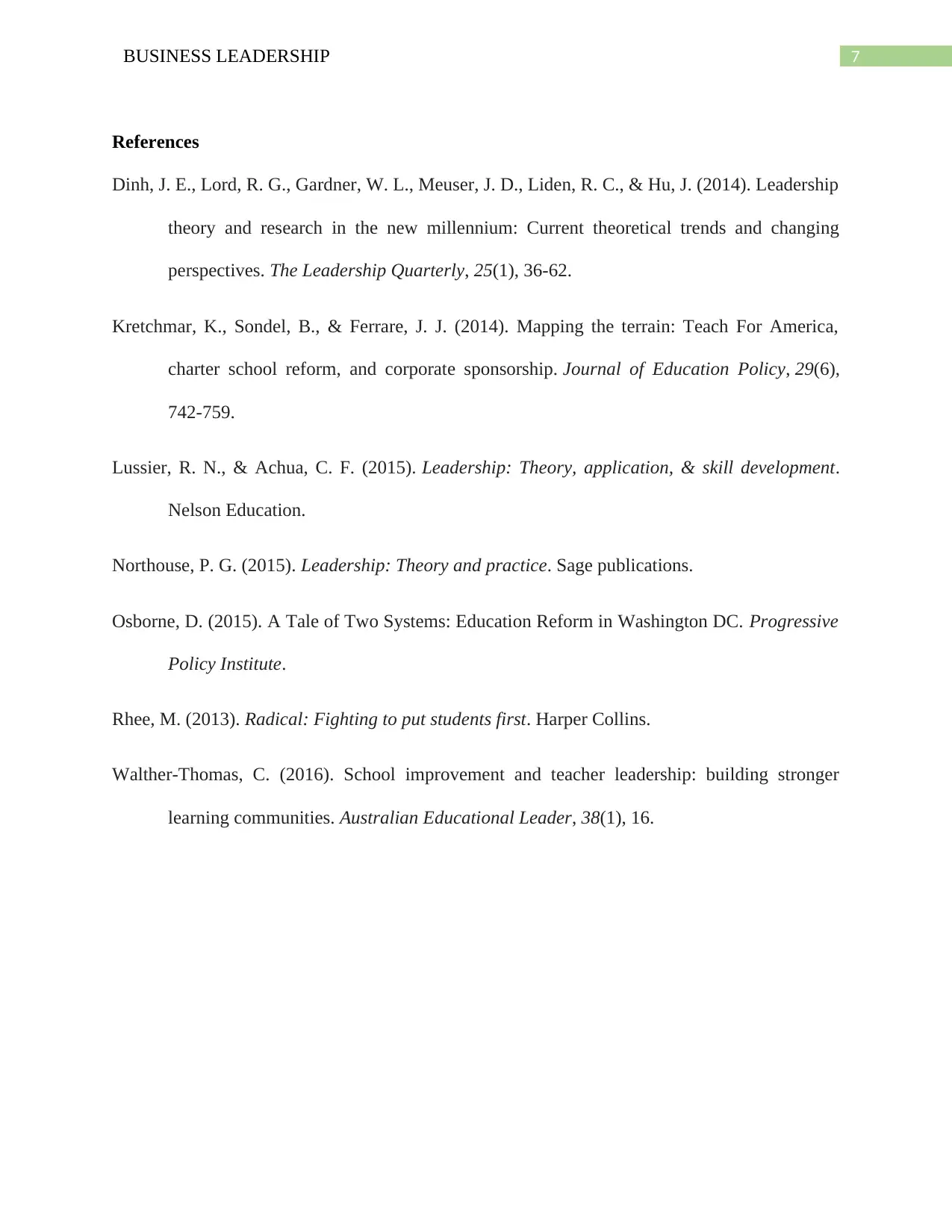
7BUSINESS LEADERSHIP
References
Dinh, J. E., Lord, R. G., Gardner, W. L., Meuser, J. D., Liden, R. C., & Hu, J. (2014). Leadership
theory and research in the new millennium: Current theoretical trends and changing
perspectives. The Leadership Quarterly, 25(1), 36-62.
Kretchmar, K., Sondel, B., & Ferrare, J. J. (2014). Mapping the terrain: Teach For America,
charter school reform, and corporate sponsorship. Journal of Education Policy, 29(6),
742-759.
Lussier, R. N., & Achua, C. F. (2015). Leadership: Theory, application, & skill development.
Nelson Education.
Northouse, P. G. (2015). Leadership: Theory and practice. Sage publications.
Osborne, D. (2015). A Tale of Two Systems: Education Reform in Washington DC. Progressive
Policy Institute.
Rhee, M. (2013). Radical: Fighting to put students first. Harper Collins.
Walther-Thomas, C. (2016). School improvement and teacher leadership: building stronger
learning communities. Australian Educational Leader, 38(1), 16.
References
Dinh, J. E., Lord, R. G., Gardner, W. L., Meuser, J. D., Liden, R. C., & Hu, J. (2014). Leadership
theory and research in the new millennium: Current theoretical trends and changing
perspectives. The Leadership Quarterly, 25(1), 36-62.
Kretchmar, K., Sondel, B., & Ferrare, J. J. (2014). Mapping the terrain: Teach For America,
charter school reform, and corporate sponsorship. Journal of Education Policy, 29(6),
742-759.
Lussier, R. N., & Achua, C. F. (2015). Leadership: Theory, application, & skill development.
Nelson Education.
Northouse, P. G. (2015). Leadership: Theory and practice. Sage publications.
Osborne, D. (2015). A Tale of Two Systems: Education Reform in Washington DC. Progressive
Policy Institute.
Rhee, M. (2013). Radical: Fighting to put students first. Harper Collins.
Walther-Thomas, C. (2016). School improvement and teacher leadership: building stronger
learning communities. Australian Educational Leader, 38(1), 16.
1 out of 8
Related Documents
Your All-in-One AI-Powered Toolkit for Academic Success.
+13062052269
info@desklib.com
Available 24*7 on WhatsApp / Email
![[object Object]](/_next/static/media/star-bottom.7253800d.svg)
Unlock your academic potential
Copyright © 2020–2026 A2Z Services. All Rights Reserved. Developed and managed by ZUCOL.





